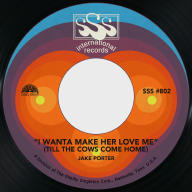Porter released a great deal of material on his own Combo label in the '50s, most of the sides recorded without having to leave his basement. The budget was nonexistent, meaning the artists Porter produced were usually either just starting out or at a later career point when bigger firms were passing them by. In many cases the acts cut tunes written by Porter and his songwriting collaborators. His biggest hit from this period was Ko Ko Mo (I Love You So), written with Eunice Levy and Forest Wilson, subsequently recorded by Gene Eunice, the Crew Cuts, the Flamingos, Perry Como, and Louis Armstrong, among others. The great Johnny Guitar Watson made his recording debut on Combo. Porter originally started the label in 1951 to deal with the music he was making in his own groups such as Jake Porter the Buzzards, but obviously had an ear for new talent.
The Combo period lasted for about seven years, during which time Porter wound up withdrawing from full-time playing to deal with business management responsibilities. By then he had already spent more than two decades in the music business, going from studying violin to cornet in the '20s and beginning his professional gigging in 1931 under the auspices of bandleader Melvin Parks. During this decade he played in the big bands of Lionel Hampton and Saunders King, the former association providing the majority of his trombone credits. Porter first came to Los Angeles in 1940, spending several years playing with bassist Slam Stewart, guitarist Slim Gaillard, and others before getting nabbed by Uncle Sam. He played solely for the U.S. Army Calvary Band until the spring of 1943, then was busy with Benny Carter, Fats Waller, Noble Sissle, and both Fletcher and Horace Henderson.
This artist began helming his own bands after the mid-'40s, pausing briefly to be hired and then fired by the touchy Benny Goodman. In 1958 he had finished with Combo and began a different stage of his career, diverse both in locale and genre. The Canadian bandleader Mike Riley made use of Porter in 1964; near the end of that decade Porter was touring with Little Richard. During the '70s Porter kept busy working as a musicians' union official as well as doing freelance work in film studios and taking off on occasional tours, including a European outing in 1978. He can be seen onscreen, basically playing himself as a younger man, in Martin Scorsese's musical #New York, New York -- not that this is a good enough reason to sit through this wretched film. ~ Eugene Chadbourne, Rovi












